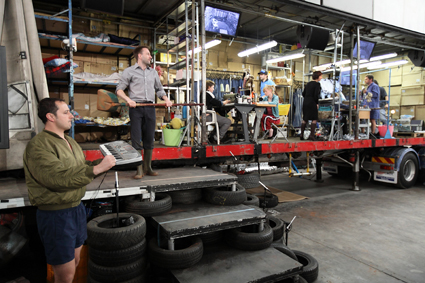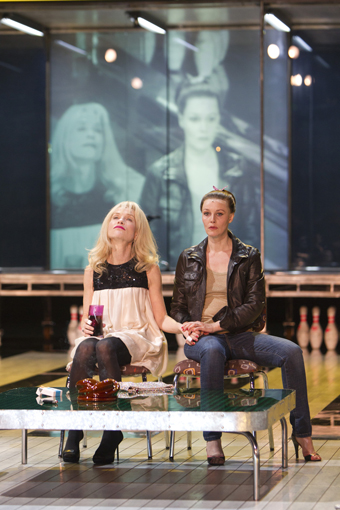adelaide festival: the demands on feeling
jonathan bollen: hard to be a god; a streetcar; gardenia

Hard to be a God
photo Tony Lewis
Hard to be a God
WE MEET AT THE CROSSROADS IN BOWDEN, A ONCE-INDUSTRIAL INNER SUBURB OF ADELAIDE, NOW UNDERGOING TOO-SLOW TRANSFORMATION. THE PERFORMANCE WILL TAKE PLACE IN A WAREHOUSE, A PRE-FAB COLORBOND ENCLOSURE, SLUNG UP TO HOUSE A BROAD CONCRETE SLAB. OUTSIDE, A FESTIVAL CROWD MILLS IN THE DUST.
We are invited inside, as the show gets underway. Hard to be a God is performed off the back of two semi-trailer trucks. Set at right angles to each other, one truck is a platform for on-stage action, the other a screen for projections. The audience is seated, rather comfortably, in the rectangle between, on tiered banks of plastic chairs.
This is transient theatre with an interventionist feel. Its politics are transportable, the scenario universal. Hungarian director Kornél Mundroczó explains in the program: “this transitory situation is very familiar: being at someone’s mercy while being on the road illegally, fleeing from somewhere.” We are witness to their transit suspended: three young women, sewing jeans in a truck-top sweatshop, are kept busy by a bossy fourth, who enslaves them to their work, and trades them to the men for sex. The motley gang of men use the women, one after the other, to make porn in the other truck. We have been warned.
In this off-stage action—relayed by hand-held video camera, with live feeds projected onto screens—a naked woman screams as her back is scalded with hot water; another’s neck is broken, or so it seems, from too much rough handling; a third, now pregnant, struggles at the prospect of being buried alive. These pornographic scenes of sadistic violence are spliced into an on-stage flow depicting forced labour, industrial accidents, medical interventions—urine tests, an abortion. Violent sexuality mixes with lyrical solidarity. The characters sing and dance at times to alleviate the boredom, the degradation—and to cheer us up, it seems.
Mundroczó draws the moral dramaturgy of Hard to be a God from the sci-fi novel of the same name by the Russian brothers Arkady and Boris Strugatsky. The novel lends a political sub-plot of extremism and extortion to the performance: a sister raped, a son turns on his politician father. It also lends a theological dimension: witnessing the cruelty of God’s creations, an angel-man exacts revenge on our behalf in a final splatter-act of retribution. The performance closes on an ethereal moving image of this angel-man, floating backwards in a boat along the wetlands of eastern Europe.
The performance also seeks to extend its moral reach with a retro-soundtrack of emotional devastation: Dire Straits’ “Brothers in Arms” accompanies the closing image; Gene Pitney’s “Something’s Gotten Hold of My Heart,” Burt Bacharach’s “What the World Needs Now” and the Pop-Tops pan-European hit “Mamy Blue” momentarily elevate our interest and sketch the contours of hope. At other times, the look and feel of the performance is grimly realistic, desperate and fatalistic. The sweatshop set is meticulous in its clutter, greasy with machinery, with steaming racks of clothing and factory waste. It is work-wear, industrial protection and trade tools for the men; stretch-knits, tracksuits, underwear and nudity for the women.
The production’s mediation of off-stage sexual violence is realistic, but somewhat numbing in effect. The day after, I felt flat. Like surgery under local anaesthetic, I could see violence inflicted but I didn’t feel the pain. For me the moment of greatest agitation was a disturbance in the audience half-way through. The lights came up, the stage manager intervened, and a couple walked out, before one of the actors sought our permission to continue. At first, I thought they were a plant: an act of staged objection to highlight our inaction. And then I wondered nervously: were they actually offended? But no. Next morning, in an email, the festival’s senior publicist sought to reassure us with innocuous affect: “the audience member who was unwell last night has a pre-existing medical condition. He recovered quickly and apparently this happens to him regularly.”

Isabelle Hupert, Florence Thomassin, A Streetcar
photo Shane Reid
Isabelle Hupert, Florence Thomassin, A Streetcar
A Streetcar from Odéon Théâtre de L’Europe seems likewise premised on assumptions about anaesthesia and the audience. Director Krzysztof Warlikowski overcomes the intimate stage realism of Tennessee Williams’ play with a production of grand expanse, hard surfaces and voluble performances.
The performance opens at Adelaide’s largest theatre with actor Isabelle Huppert as Blanche Dubois babbling behind glass. She is encased in an elevated bathroom-hallway that extends horizontally across the stage, rolls on tracks in the stage like a streetcar, and is glazed with ‘electronic privacy glass’—ceiling-to-floor plate-glass panels that switch between transparent and opaque. In opaque mode, they serve as screens for video projection of live action, black-and-white in evocation of Elia Kazan’s 1951 film.
What I feel foremost of this performance is the smoothness of its surface. The main area of the stage is a suite of ten-pin bowling alleys that reach into its depth. Yet when Huppert descends onto the stage my depth perception is at a loss. The emotional volatility of Blanche’s intervention between Stella and Stanley (played by Florence Thomassin and Andrzej Chyra) is flattened by the monophonic consistency of the actors’ voices. As in music theatre, they wear microphones to amplify their voices. The disarticulation of actors’ voices from the spatiality of their presence makes me feel like I have lost my sense of touch. It is as if the entire performance were playing out behind glass.
Warlikowski’s direction seems driven to overcome the prospect of an audience at a distance from the actors, cut-off and out-of-touch. Tiny interactions and minute gestures are retrieved by video from inaccessible spaces—in the bathroom, under the bed, beside the couch—and magnified with projection to amplify their presence on such an expansive stage. Transformations in the actors’ portrayals of their characters’ emotional trajectories are ‘telegraphed’ with an intricate plot of wig and costume changes.
Transformations in the dramaturgy of minor characters amplify the psychic theatricality of Blanche’s plight. Her homosexual husband—”un jeune homme” played in grand-guignol style by Cristián Soto—is brought back from the dead to dance the tango on stage with Mitch (Yann Collette). The role of Eunice, Stella’s friendly upstairs neighbour, is enlarged by Renate Jett into singer-interlocutor—belting out Pulp’s “Common People,” Eric Carmen’s “All By Myself” and other songs, juxtaposing key moments with the delivery of inter-texts (from Oedipus, apparently, from Wilde, Flaubert and Dumas), and stepping into the audience at the interval for some light-hearted banter about love, romance and relationships.
Warlikowski’s directorial strategy is multi-channel amplification, blasting through the script to expose the theatricality of the psycho-sexual on an operatic stage. I make contact with the work. But was this contact premised on an assumption that I wouldn’t? That without the amplifiers, I’d feel nothing?
By comparison, Gardenia from Alain Platel and Frank van Laecke of Les Ballets C de la B transacts a simple encounter with its audience. Nine elderly people of transitive genders, a ‘young guy’ and a ‘real woman.’ Wearing suits, they each undress revealing the frocks they wear beneath.
One tells jokes, one sings, another reminisces. They address the audience directly. They mince and pose and pout as an ensemble. They don wigs, slap on make-up, slip on heels. They swing handbags to Ravel’s Bolero and mime the words to songs. They spread red carpet on a parquet floor. They walk.
As a performance, Gardenia is not much more than that. “The journey is so dear to us,” advise Platel and van Laecke. “We advance without hurrying.” The show unfolds at walking pace. There is no assumption that I feel nothing. And no demand that I feel more.
2012 Adelaide International Arts Festival: Hard to be a God, director Kornél Mundroczó, Old Clipsal Site, Bowden, March 8-14; A Streetcar, based on A Streetcar Named Desire by Tennessee Williams, director Krzysztof Warlikowski, Odéon-Théâtre de L’Europe, Festival Theatre, March 14-17; Gardenia, directors Alain Platel, Frank van Laecke, Les Ballets C de la B, Dunstan Playhouse, March 2-5
RealTime issue #109 June-July 2012 pg. 10






